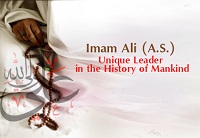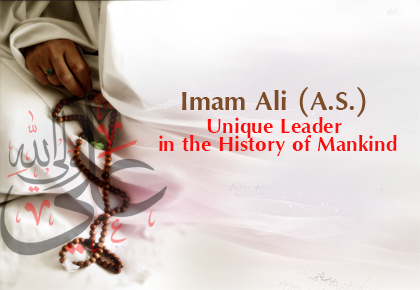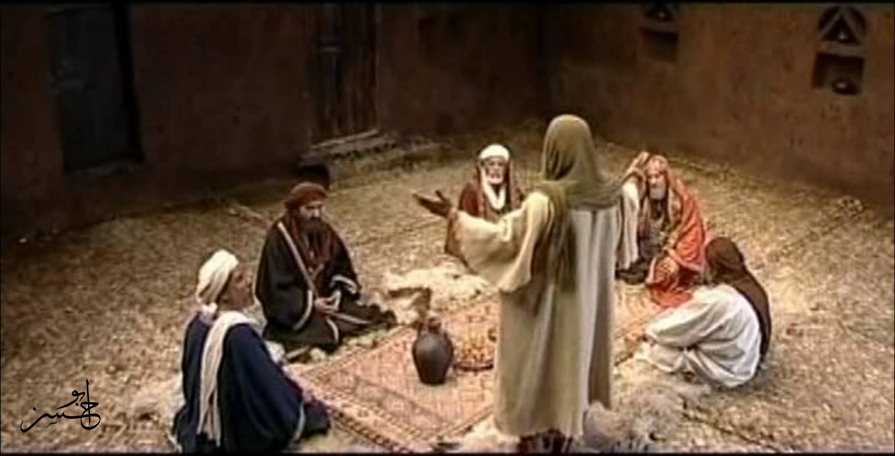
Imam Ali (A.S.),Unique Leader in the History of Mankind
The history of mankind
has witnessed many leaders over the ages. Many of these leaders achieved
leadership through might or inheritance and some were chosen as leaders because
of certain outstanding qualities that they possessed. Among the latter group
there have also emerged some leaders whose works and contribution to humanity
cannot be limited to any particular time or place; and their life-styles, their
works and the sayings of such heroes continue to inspire and motivate people,
generation after generation.
Amir al-Muminin,
Ali ibn Abu Talib is a unique leader who stands out among all other leaders.
Besides Shi"as who believe in his Imamate and Vilayat, many non-Muslims
have praised his personality and unique qualities and made attempts to
highlight certain aspects of the personality of this everlasting leader of ages
and have written hundreds of books and research papers about him.
Imam Ali (A.S.) was
brought up by the Messenger of Allah (PBUH) and under his guardianship and was
elevated to such a stage that it would be no exaggeration to say that he is
Islam’s gift to the world of humanity.

Imam Ali’s (A.S.) life was not the repetition of other people's lives, rather his life shed light on certain aspects of human life which had so far been undiscovered. He was born in Allah's House (Ka"ba) and was martyred in Allah's house (mosque) and his main principle throughout his life was winning Allah's Satisfaction. Hence, one would not be wrong to say that any research on Imam Ali's (A.S.) life and personality would highlight an aspect of his life that could be taken up as a role model for the people who seek truth; Muslim or otherwise.
Imam Ali (A.S.) from
Birth to the Dawn of Islam:
Ali (A.S.) was the
son of Abu Talib ibn-e Mutallib and Fatima bint Asad ibn-e Hashim. He was born
on 13th Rajab, 30 years after Amal-Fil. His life began in the Holy Kaba, 1
which became the Qiblah of Muslims and ended in the Mosque of Kufa (Iraq).
It was Allah's Will
that from the early days of his life, the Prophet of Allah be brought up on his
lap. Mecca and Quraysh were struck by famine. Muhammad (SAW) met his other
paternal uncle Abbas who was a wealthy man and made a suggestion to him to
support Abu Talib (S.A.) by taking up the guardianship of some of his children.
Abbas welcomed the suggestion and they met Abu Talib (S.A.) and informed him of
their intention. Abu Talib (S.A.) said: "Leave Aqil for me..." Muhammad
(PBUH) chose Ali (A.S.), and Abbas took Ja’far. Later on, the Messenger of Allah
(PBUH) is known to have said: "I chose the one Allah had chosen for
me."
Some writers are of
the opinion that by accepting Imam Ali’s (A.S.) guardianship, the Prophet
(PBUH) meant to compensate for the favors he had received from Abu Talib and
Fatima (Ali's parents), who looked after him like their own children during his
childhood. However, from what the Prophet (PBUH) had said and from Ali’s (A.S.)
behavior - it is quite clear that it was Allah's Will that Ali (A.S.) should
grow up with the Prophet (PBUH) and under his guardianship.
The young Ali’s
(A.S.) personality was being shaped by Muhammad (PBUH), when the latter
declared his prophethood. According to most historians, Ali (A.S.) was the
first among the men to embrace Islam. Ali (A.S.) was the only disciple of the
Prophet (PBUH) who had never bowed before or worshipped idols.
He had no other
ideal but to seek Allah and His prophet’s (PBUH) satisfaction, and his
sincerity, steadfastness, sacrifice, and bravery in supporting `Tawhid"
were some of his outstanding qualities no one can ever deny.

From the Dawn of Islam to the prophet’s (PBUH) Demise:
The Dawn of Islam
in Arabia, which was stricken with ignorance (Jahiliyah) and superstitions, not
only changed the course of history in that land but also influenced other
nations and peoples of the world. Savage customs that were considered as values
in those times - communal rivalries, burying baby-girls alive, etc., were rendered
as disgraceful and inhuman by the new religion of Islam. This change in the
social and individual beliefs and customs was the fruit of the years of
struggle and endeavor by the Prophet (PBUH) and his close and sincere
companions among which Ali (A.S.) played the greatest role. His contribution to
the spread of Islam was exemplary and he was the greatest gift of Islam and its
Prophet (PBUH) to humanity. A voluminous book is required to write about Imam
Ali’s (A.S.) contribution towards the establishment of Islam but in this
discussion, we shall confine ourselves to reviewing only a few of them.
1. Important Incidents that took place in Mecca:
a) Yom al-Anzar
After the verse
"... and warn your nearest relations ...," was revealed, the Prophet
(PBUH) was commissioned by Allah to make public, the invitation to accept
Islam. Thus, he asked Ali (A.S.) to prepare a meal and invited his close
relatives over. After the meal, he publicly announced his Prophethood and
asked: "Which one of you will support me in my mission to be my brother,
successor and caliph?" Only Ali (A.S.) stood up to swear allegiance, and
the Prophet (PBUH) introduced him as his successor and caliph.

Despite all the
efforts by Quraysh to prevent Islam from spreading, the people of
"Yathreb" embraced Islam and swore allegiance to protect it with
their swords. This news outraged the Quraysh who in an emergency meeting
decided to assassinate the Prophet (S.A.W.) collectively. On uncovering this
devious plot, the Prophet (PBUH) requested Ali (A.S.) to wear his mantle and to
sleep in his place 7, in order to foil the evil plans of the enemies of Islam
and to facilitate his `Hejira" (Migration) from Mecca to Medina. It was
after this incident that reflected the deep devotion, courage and commitment of
Imam Ali (A.S.) towards the Messenger of Allah (PBUH) and his divine mission,
that Jibrail (A.S.) conveyed the news:
"O" son of Abu Talib, there is none like you; Allah boasts
to the angels of the seven heavens about you!"
2- Important Events in Medina:
The prophet’s
(PBUH) migration to Medina is a turning point in the history of Islam after
which it went through a lot of ups and downs. Ali (A.S.) had an outstanding
role in the events that followed the prophet’s (PBUH) migration, a few of which
are mentioned hereunder:
a) Ali’s (A.S.) Marriage with Fatima (S.A.)
After prophet’s
(PBUH) migration, Imam Ali (A.S.) was given the responsibility of bringing
Hazrat Fatima (S.A.), the beloved and devoted daughter of the Prophet (S.A.W.),
to Medina. A few months later Ali (A.S.) married Fatima (S.A.). Ya`qubi, the
Muslim historian writes:
"A group of
`Muhajers' (those who had migrated from Mecca to Medina) had proposed for
Fatima’s (S.A.) hand in marriage. On hearing about her marriage with Ali
(A.S.), some of them raised objections. In reply to their objections, the
Prophet of Allah (PBUH) said: “I did not marry Fatima to Ali, rather it was
Allah Who married her to Ali.” 9 Interestingly, the prophet’s (PBUH) lineage
has been through Fatima (S.A.) and Ali (A.S.).

b) Brotherhood with the Prophet (PBUH)
To bring the
Muhajers and Ansars closer to each other, the Prophet (PBUH) decreed that the
Muhajers and Ansars should make brotherhood pacts among themselves; in pairs.
However, he chose Imam Ali (A.S.) as his brother and said to him: "You are my brother, successor
and inheritor and I inherit from you."
c) The prophet’s (PBUH) Description of the
Manner of Ali's Martyrdom
During the Battle
of Zat ol-Ashira, that took place in the second year of Hejira, the Prophet
(PBUH) sent Ali (A.S.) and Ammar on a mission. After some time the Prophet
(PBUH) joined them and found them asleep. After waking them up, he said: 'should I inform you about the two most wretched men of
all people?" On receiving their positive response, he then added: `The man
who slew Saleh's camel and the man who will hit you (Ali) on the head and will
make your blood flow to your beard."
d) Ali's Unique Bravery in the Battles
Except for the
Battle of Tabuk in which Ali (A.S.) remained in Medina on the prophet’s (PBUH)
order, he had participated actively in all the battles and played a decisive
role in all of them. Although it is not possible to discuss Ali's (A.S.) role
in all these battles, we shall attempt to highlight a few of them.
i) Ali's role in
the battle of Badr cannot be comparable to any of the other companions. As
written by some historians, he killed 32 enemy soldiers single-handedly.
Interestingly, 33
years later when Ali (A.S.) was forced to accept the caliphate, a group of
Quraysh like Sa`id ibn-e Aas and Walid ibn-e Aqrabeh, who later on participated
in the battles of Jamal and Siffin against Imam Ali (A.S.), were hesitant to
swear allegiance because he had killed their fathers in the Battle of Badr.
ii) Imam Ali (A.S.)
was the only companion of the Prophet of Allah (PBUH) who never fled from the
battlefield. History has recorded that many of the close companions of the
Prophet (S.A.W.) fled during the battles of Uhud, Kheybar and Hunayn.
e) Imam Ali (A.S.) was
appointed to communicate `Surat al-Bara"at"
After the
revelation of `Surat al-Bara"at", the Prophet (PBUH) appointed one of
his companions to communicate the messages to the unbelievers. However, before
this companion reached Mecca, the Prophet (PBUH) sent Imam Ali (A.S.) to take
the newly-revealed verse from him and to personally communicate it to the
unbelievers. On their return to Medina this companion asked the Prophet (PBUH)
for the reason of this change of decree, to which the Prophet (PBUH) replied:
"It was Allah's will that it should be communicated by a member of my
Household."

f) Ali was a Judge in Yemen during the last few years of the Prophet's (S.A.W.) Life.
After the prophet’s
(PBUH) migration to Medina from Mecca, Islam spread rapidly in the Arabian
Peninsula as a result of which Imam Ali (A.S.) was often sent by the Prophet
(PBUH) to propagate Islam in different regions. However, what is of great
importance is the mission that was not given to any other companion. Towards
the end of his life, the Prophet of Allah (PBUH), asked Imam Ali (A.S.) to go
to Yemen which was a rather civilized society in those days, to discharge the
duties of a judge (qazi). It has been narrated that Imam Ali (A.S.) told the
Prophet (S.A.W.): "I am young and do not know
about judgment." The Prophet of Allah (S.A.W.) put his hand on the young Ali’s
(A.S.) chest and prayed: "O Allah! Guide his
heart and make him articulate in judgment." Here Belazari has quoted Imam Ali
(A.S.) as saying: "I swear by Allah
that I have never been in doubt while passing a judgment between the disputing
parties."
After the prophet’s
(PBUH) demise, the caliphs and particularly the second caliph frequently asked
for Ali's (A.S.) opinion on various issues and in their judgments.
g) Ghadir-e-Khom
Both the Sunni and
Shi"a sources have narrated a number of incidents that highlight the
status and position of Imam Ali (A.S.). However, undoubtedly one of the most important
incidents is the `Ghadir-e-Khom". On his return from Hajjatul-Vida at a
location famous as `Ghadir-e-Khom, the Prophet (PBUH) delivered a very
important sermon and while holding and lifting the hand of Imam Ali (A.S.),
clearly asked the people gathered there:
"O people! Is it
not true that my `Vilayat" over you (believers) is of more importance than
your `Vilayat" over yourselves?" To this
question, the people answered in the affirmative. Then the Prophet (PBUH)
announced: "The one whose Mawla
(Master) I am, Ali is his Master. O Allah! Love him who loves Ali, and be the
enemy of the enemy of Ali...."
In that gathering
at Ghadir-e-Khom, the Prophet (PBUH) also spoke regarding other important
matters that stress on the importance of Imamate and Vilayat in the Islamic
context. One of his important announcements was as follows:
"O people! I shall
soon be departing from your midst. And you will meet me at the Pond of
`Kawthar". Then I will ask you about two precious things (Thaqalayn). So
be careful as to how you treat these two, after my demise."
Then the people
inquired from the Prophet (PBUH) regarding the "two precious things"
which he had referred to.
The Prophet (PBUH)
explained: "One of them is the
Qur’an- one end of which is in Allah’s Hand and the other is in yours. So stick
on tightly to it, so that you protect yourself from being misled. And the
second one is my Pure Household."
At the end of the
prophet’s (PBUH) sermon, many of the people came forward to congratulate Ali
(A.S.) and to extend their hands in allegiance to him. While yet others, were
confounded with doubt and ambiguity. However, as for reliable Islamic sources,
this incident has strong recorded evidence and it has been narrated through
many chains of transmission of both Shi"a and Sunni schools of thought.
Al-Maaref: Islamic Organization
بتوقيت بيروت